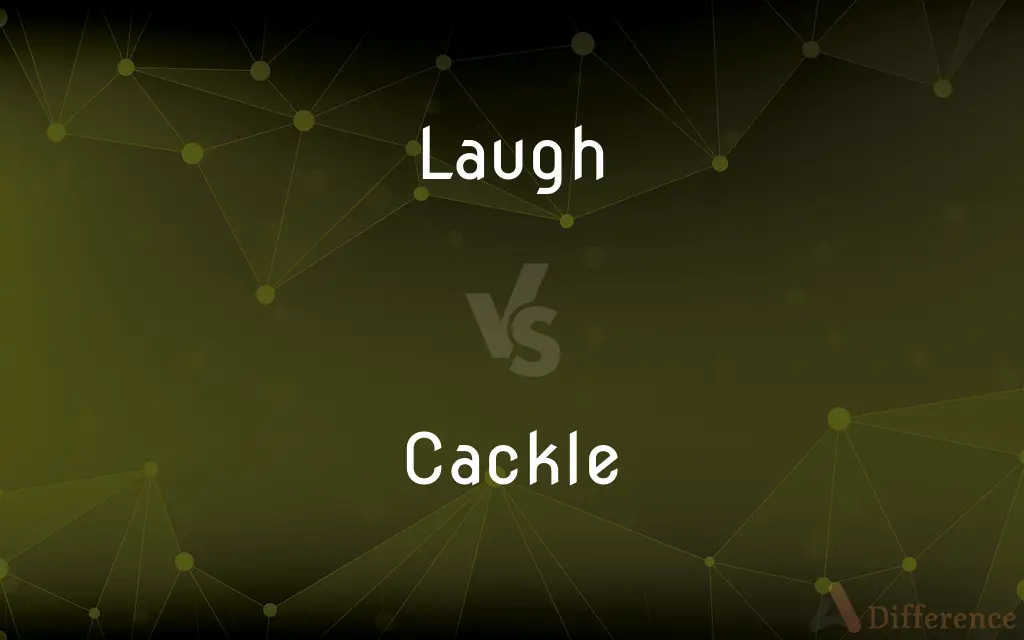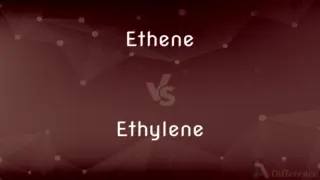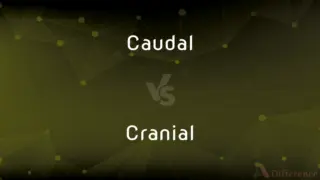Laugh vs. Cackle — What's the Difference?
By Maham Liaqat & Urooj Arif — Updated on March 15, 2024
Laughing is a common, spontaneous expression of amusement or joy, while cackling refers to a loud, harsh laugh, often conveying mockery or wickedness.

Difference Between Laugh and Cackle
Table of Contents
ADVERTISEMENT
Key Differences
Laughing is a universal human response to humor, happiness, or even nervousness, characterized by a range of sounds from soft chuckles to loud guffaws, depending on the intensity of the emotion and the individual's personality. On the other hand, cackling is a specific type of laugh that is sharper and more pronounced, often associated with a sense of schadenfreude, sarcasm, or the stereotypical portrayal of witches. Unlike the generally positive or neutral connotations of laughing, cackling might be perceived as unsettling or annoying due to its piercing quality and the contexts in which it is typically used.
The sound and context of laughing can vary greatly; it can be gentle and subdued in a quiet setting, or loud and boisterous among friends. In contrast, cackling is almost always loud and distinctive, with a rhythm that sets it apart from more common forms of laughter. It's the kind of laugh that can easily be identified in a crowd and might draw attention or even discomfort from those who hear it.
In social situations, laughing serves as a bonding mechanism, signaling shared amusement and promoting group cohesion. It's an instinctive behavior that can express a range of emotions, from joy to embarrassment. Cackling, however, might not always be socially bonding; it can sometimes create distance or unease among listeners, particularly if it's perceived as derisive or sarcastic.
While everyone laughs, and it is considered a natural and healthy emotional response, cackling is less common and more context-specific. It might be adopted intentionally to convey a certain persona or reaction, or it might come naturally to some individuals, depending on their unique expression of laughter.
Understanding the nuances between laughing and cackling can provide insights into human emotions and social interactions, highlighting how different expressions of laughter can influence perceptions and relationships.
ADVERTISEMENT
Comparison Chart
Definition
A spontaneous expression of amusement, joy, or nervousness.
A loud, harsh laugh often associated with mockery or wickedness.
Connotations
Generally positive, conveying happiness or amusement.
Often negative, can imply malice, mockery, or annoyance.
Sound Quality
Ranges from soft chuckles to loud guffaws.
Characteristically loud, sharp, and rhythmic.
Social Function
Promotes social bonding and reduces stress.
Can create social distance or discomfort, depending on context.
Commonality
Universal across cultures and situations.
Less common, more context-specific (e.g., derision, sarcasm).
Compare with Definitions
Laugh
An instinctive vocal response to humor or joy.
His joke made the whole room burst into laughter.
Cackle
A distinctive, often loud and harsh laugh.
The villain's cackle echoed ominously through the hall.
Laugh
A natural stress reliever and mood enhancer.
The comedy movie provided a much-needed evening of laughter.
Cackle
Typically associated with negative emotions or contexts.
Her cackle at his misfortune was both unexpected and unsettling.
Laugh
Can range in sound from a gentle chuckle to a robust belly laugh.
Her quiet chuckle soon turned into a full-throated laugh.
Cackle
Can imply a sense of schadenfreude or sarcasm.
His cackle in response to the blunder revealed his true feelings.
Laugh
Serves as a social signal of shared amusement.
Their shared laughter over the old memory bonded them even more.
Cackle
Sometimes used to convey a specific persona or dramatic effect.
The character's cackle was part of her eccentric, villainous image.
Laugh
Reflects a variety of emotions, not just happiness.
Nervous laughter filled the room as the suspense built up.
Cackle
Often characterized by a rhythmic, piercing quality.
The witch's cackle in the play sent shivers down the audience's spine.
Laugh
To express certain emotions, especially mirth or delight, by a series of spontaneous, usually unarticulated sounds often accompanied by corresponding facial and bodily movements.
Cackle
To make the shrill cry characteristic of a hen after laying an egg.
Laugh
To show or feel amusement or good humor
An experience we would laugh about later on.
Cackle
To laugh or talk in a shrill manner.
Laugh
To feel or express derision or contempt; mock
I had to laugh when I saw who my opponent was.
Cackle
To utter in cackles
Cackled a sarcastic reply.
Laugh
To feel a triumphant or exultant sense of well-being
You won't be laughing when the truth comes out.
Cackle
The act or sound of cackling.
Laugh
To produce sounds resembling laughter
Parrots laughing and chattering in the trees.
Cackle
Shrill laughter.
Laugh
To affect or influence by laughter
Laughed the speaker off the stage.
Laughed the proposal down.
Cackle
Foolish chatter.
Laugh
To say with a laugh
He laughed his delight at the victory.
Cackle
The cry of a hen or goose, especially when laying an egg.
Laugh
The act of laughing.
Cackle
A laugh resembling the cry of a hen or goose.
Laugh
The sound of laughing; laughter.
Cackle
Futile or excessively noisy talk.
Laugh
(Informal) Something amusing, absurd, or contemptible; a joke
The solution they recommended was a laugh.
Cackle
A group of hyenas.
Laugh
Often laughs(Informal) Fun; amusement
Went along just for laughs.
Cackle
(intransitive) To make a sharp, broken noise or cry, as a hen or goose does.
Laugh
An expression of mirth particular to the human species; the sound heard in laughing; laughter.
His deep laughs boomed through the room.
Cackle
(intransitive) To laugh with a broken sound similar to a hen's cry.
The witch cackled evilly.
Laugh
Something that provokes mirth or scorn.
Your new hat's an absolute laugh, dude.
Cackle
(intransitive) To talk in a silly manner; to prattle.
Laugh
A fun person.
Cackle
To pretend to rattle (dice) in one's hand while gripping them so that they maintain their orientation.
Laugh
(intransitive) To show mirth, satisfaction, or derision, by peculiar movement of the muscles of the face, particularly of the mouth, causing a lighting up of the face and eyes, and usually accompanied by the emission of explosive or chuckling sounds from the chest and throat; to indulge in laughter.
There were many laughing children running on the school grounds.
Cackle
To make a sharp, broken noise or cry, as a hen or goose does.
When every goose is cackling.
Laugh
To be or appear cheerful, pleasant, mirthful, lively, or brilliant; to sparkle; to sport.
Cackle
To laugh with a broken noise, like the cackling of a hen or a goose; to giggle.
Laugh
To make an object of laughter or ridicule; to make fun of; to deride; to mock.
Don't laugh at my new hat, man!
Cackle
To talk in a silly manner; to prattle.
Laugh
(transitive) To affect or influence by means of laughter or ridicule.
Cackle
The sharp broken noise made by a goose or by a hen that has laid an egg.
By her cackle saved the state.
Laugh
(transitive) To express by, or utter with, laughter.
Cackle
Idle talk; silly prattle.
There is a buzz and cackle all around regarding the sermon.
Laugh
To show mirth, satisfaction, or derision, by peculiar movement of the muscles of the face, particularly of the mouth, causing a lighting up of the face and eyes, and usually accompanied by the emission of explosive or chuckling sounds from the chest and throat; to indulge in laughter.
Queen Hecuba laughed that her eyes ran o'er.
He laugheth that winneth.
Cackle
The sound made by a hen after laying an egg
Laugh
Fig.: To be or appear gay, cheerful, pleasant, mirthful, lively, or brilliant; to sparkle; to sport.
Then laughs the childish year, with flowerets crowned.
In Folly's cup still laughs the bubble Joy.
No wit to flatter left of all his store,No fool to laugh at, which he valued more.
Cackle
Noisy talk
Laugh
To affect or influence by means of laughter or ridicule.
Will you laugh me asleep, for I am very heavy?
I shall laugh myself to death.
Cackle
A loud laugh suggestive of a hen's cackle
Laugh
To express by, or utter with, laughter; - with out.
From his deep chest laughs out a loud applause.
Cackle
Talk or utter in a cackling manner;
The women cackled when they saw the movie star step out of the limousine
Laugh
The sound of laughing
Cackle
Squawk shrilly and loudly, characteristic of hens
Laugh
A facial expression characteristic of a person laughing;
His face wrinkled in a silent laugh of derision
Cackle
Emit a loud, unpleasant kind of laughing
Laugh
A humorous anecdote or remark intended to provoke laughter;
He told a very funny joke
He knows a million gags
Thanks for the laugh
He laughed unpleasantly at hisown jest
Even a schoolboy's jape is supposed to have some ascertainable point
Laugh
Produce laughter
Common Curiosities
Do all cultures perceive cackling the same way?
Cultural interpretations of cackling can vary, though it is commonly associated with negative connotations in many cultures.
Is it possible to change one's style of laughter?
While laughter styles can be somewhat malleable, they are deeply ingrained and may be challenging to change intentionally.
Can someone laugh and cackle at the same time?
A person's laughter can contain elements of both, especially if it starts as laughter and turns into a cackle based on the emotional context.
Can laughter be involuntary?
Yes, laughter can be an involuntary reaction to certain stimuli, often beyond one's control.
How is laughter beneficial to health?
Laughter has been shown to reduce stress, boost immunity, and improve mood, among other health benefits.
Is cackling always negative?
While often perceived negatively, cackling can also be simply a unique form of laughter for some individuals, devoid of malicious intent.
Is cackling used in literature and media?
Cackling is often used in literature and media to characterize villains or to create a specific atmosphere.
Are there professional studies on laughter?
Yes, the study of laughter, known as gelotology, explores its effects on the body and mind and its social functions.
Can animals cackle?
Some animals, especially certain bird species, produce sounds that might be described as cackling, but it's not the same as human laughter.
Is forced laughter as beneficial as spontaneous laughter?
While spontaneous laughter has more genuine health benefits, forced laughter can still improve mood and reduce stress to some extent.
Can laughter therapy be effective?
Laughter therapy, which uses the natural physiological process of laughter to relieve physical or emotional stress, has been found beneficial in various therapeutic settings.
How do social norms influence laughter?
Social norms and cultural contexts significantly influence when, how, and with whom people laugh, shaping laughter's social acceptability and expression.
How does the brain react to laughter?
Laughter triggers the release of endorphins, the body's natural feel-good chemicals, promoting an overall sense of well-being.
Can laughter be a defense mechanism?
Yes, laughter can be used as a defense mechanism to mask discomfort, nervousness, or to deflect from emotionally charged situations.
Share Your Discovery

Previous Comparison
Ethene vs. Ethylene
Next Comparison
Caudal vs. CranialAuthor Spotlight
Written by
Maham LiaqatCo-written by
Urooj ArifUrooj is a skilled content writer at Ask Difference, known for her exceptional ability to simplify complex topics into engaging and informative content. With a passion for research and a flair for clear, concise writing, she consistently delivers articles that resonate with our diverse audience.














































